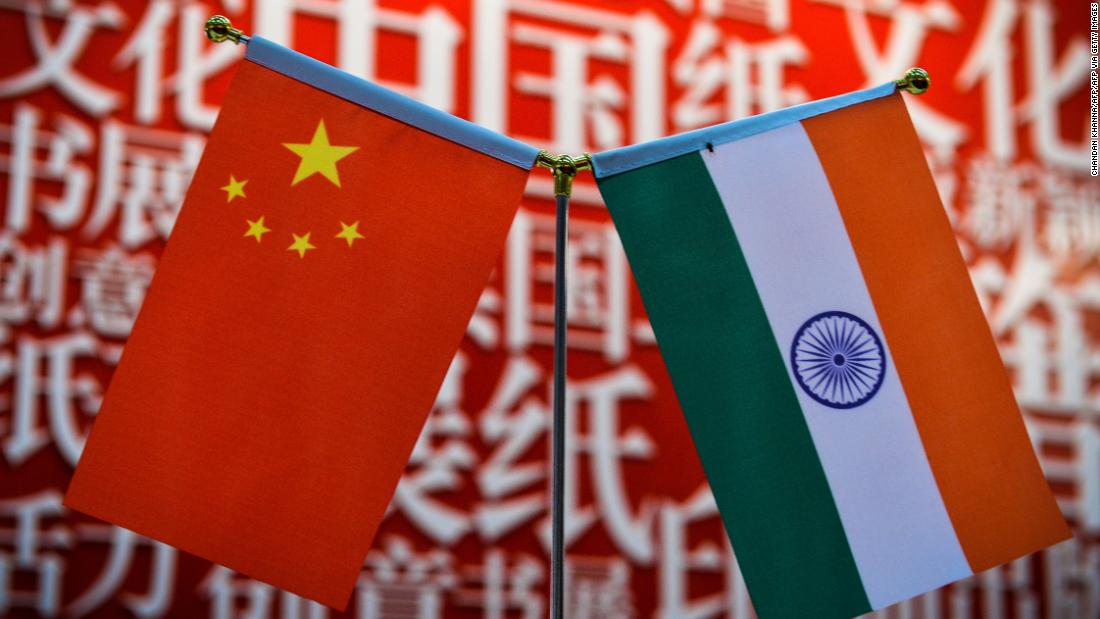
Tensions have been growing in the Himalayas along one of the world's longest land borders, with New Delhi and Beijing both accusing the other of overstepping the Line of Actual Control (LAC) that separates the two. The territory has long been disputed, erupting into numerous minor conflicts and diplomatic spats since a bloody war between the countries in 1962.
On Saturday, military leaders met at the border to "peacefully resolve the situation in the border areas," according to a statement from India's foreign ministry. Even today, just what occurred on the ground in the highly militarized region remains unclear -- in part because the main body of this distinctly 21st-century conflict has so far mostly played out through propaganda, strategic leaks and aggressive posturing in the media.
Ahead of Saturday's meeting, Chinese broadcasters aired footage of People's Liberation Army (PLA) maneuvers in the region -- complete with planes and trucks full of troops -- in what state media described as "demonstrating China's capability of quickly reinforcing border defenses when necessary." Unconfirmed -- and in some cases, debunked -- videos have also circulated on both Chinese and Indian social media purporting to show troop incursions and scuffles between soldiers.
Writing in India's Hindustan Times, strategic affairs analyst Shishir Gupta said Sunday that Chinese reports on PLA maneuvers were part of a "disinformation campaign" designed to sap Indian resolve, and "overwhelm the enemy into panic so that his capacity to negotiate is weakened."
Jingoistic rhetoric
Both Chinese President Xi Jinping and Indian Prime Minister Narendra Modi have built public support in large part on nationalism and a promise of future greatness. This often translates into jingoism and aggressive rhetoric, particularly when playing to a domestic audience.
Such an approach was evidenced in Chinese coverage of the PLA maneuvers in the Himalayas. Equally, despite Delhi's announcement Saturday of easing tensions, leading Indian government figures struck an aggressive tone Monday, with Home Affairs Minister Amit Shah telling a rally of the ruling Bharatiya Janata Party (BJP) that "any intrusion into the the borders of India will be punished."
"Some used to say that US and Israel were the only countries which were willing and capable of avenging every drop of the blood of their soldiers," Shah said. "(Modi) has added India to that list.''
Defense Minister Rajnath Singh also weighed in Monday, saying: "I would remind everyone, India's leadership will not let our self respect suffer. India's policy is clear, we won't hurt any country's integrity and dignity. At the same time we will not let any country to hurt our integrity."
Their statements came amid growing pressure from opposition parties to take a stronger line, with the Congress party's Rahul Gandhi repeating claims that Delhi was downplaying the scale of the Chinese incursion, saying in a tweet "the media is muzzled and terrified. The truth seems dormant."
Long-running dispute
In a piece Tuesday published by the Global Times -- a nationalist, Chinese state-backed tabloid -- and republished by the official website of the PLA, military analysts predicted that "the ongoing standoff is not likely to end immediately, as concrete issues must still be resolved."
How resolvable those issues actually are is unclear, given they date back decades and are largely fueled by both sides' refusal to accept the other's territorial claims. Tensions grew late last month amid accusations both countries had overstepped the LAC and were reinforcing their military position on the de facto border.
"A 'status quo ante' will require that Chinese soldiers vacate areas where they have dug in for weeks now. Nothing short of their full withdrawal should satisfy India, which means that more than talks on the ground and by diplomats, there is a need for strong political direction from Beijing to the PLA to do that," The Hindu, a leading Indian newspaper, noted in an editorial this week. "Otherwise, India must prepare for a long-drawn stand-off, and manoeuvres aimed at ensuring China's pull back."
If China's propaganda and very public PLA deployments are designed to persuade India to back off, Delhi may be looking for similar influence in emphasizing and building its international ties, linking the border issue to other disputes China has in the wider Asia-Pacific region.
Last week, India and Australia signed two bilateral military agreements in the "first step in deepening of the defense relationship" between the two Indo-Pacific powers. India has also been increasing its defense cooperation with the US, including with the annual Malabar naval exercises, also involving Japan.
This strategy has not gone unnoticed in Beijing. China Daily, another state-run newspaper, said in an editorial that "contrary to the sober-minded stance adopted by China and India, some excitable politicians in the United States seem eager to whip up hostilities between the two giant neighbors."
"(Washington's) offer to help may have emboldened some in India to take a tougher stand against China in order to 'defend its pride'," the paper added.
Writing late last month, Chinese analyst Long Xingchun warned Delhi to "keep a sober head to not be used as cannon ash by the US."
"Although China's relationship with the US is tense, the international environment for China is much better than it was in 1962 when India started and (was) crushingly defeated in a border war with China," Long wrote. "In 1962, the national strength of China and India were comparable. Today by stark contrast, China's GDP is about five times that of India."
For now, outright aggression is confined to the media. But with tensions running hot despite the efforts of military figures Saturday, the likelihood of this problem going away soon seems highly unlikely.
"Media" - Google News
June 09, 2020 at 05:42PM
https://ift.tt/2MJyPbI
The border spat between India and China is turning into an all-out media war - CNN
"Media" - Google News
https://ift.tt/2ybSA8a
https://ift.tt/2WhuDnP
Bagikan Berita Ini














0 Response to "The border spat between India and China is turning into an all-out media war - CNN"
Post a Comment